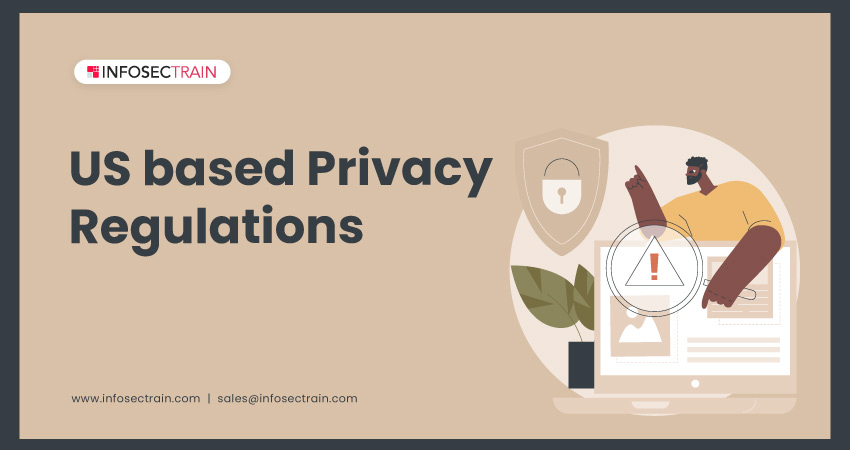US Based Privacy Regulations
Privacy has always been a concern for individuals, businesses, and governments. As a result of the expeditious advancement of technology, the collection, use, and sharing of personal information have become widespread among businesses. As one of the world’s leading economies, the United States has established numerous privacy laws and regulations to protect the personal information of individuals and has a comprehensive framework of privacy regulations to defend the interests of its citizens. The purpose of these regulations is to give individuals more control over their personal information, to encourage transparency and accountability among enterprises, and to prevent the misuse of personal information. This article will provide an overview of US-based privacy regulations.

Table of Contents
Introduction to data privacy
Why are privacy regulations necessary?
What are privacy laws?
U.S.-based privacy regulations
Enforcement and Penalties
Introduction to data privacy:
Data privacy refers to the protection of personal information that individuals share with organizations, institutions, or other entities. It involves ensuring that sensitive data is collected, processed, stored, and used only in ways consistent with the data subjects’ expectations and preferences.
Data privacy is essential because it safeguards individuals’ fundamental right to privacy and helps prevent the misuse of personal information. In today’s digital age, where data is constantly collected and analyzed, ensuring data privacy is crucial to maintaining trust and confidence in organizations and institutions that handle personal data. It also helps prevent identity theft, fraud, and other forms of cybercrime, which can cause significant damage to individuals and society as a whole.
Why are privacy regulations necessary?
Privacy regulations are vital to protect individuals’ personal information from being used or shared without their consent. In today’s digital age, personal data is often collected and processed by companies, governments, and other entities, and without proper regulations, this information can be misused, resulting in identity theft, financial fraud, and different harmful outcomes. Privacy regulations ensure that organizations collect, use, and share personal data transparently and lawfully, giving individuals greater control over their personal information and reducing the risk of harm. Additionally, these regulations help build trust between individuals and organizations, which is essential for maintaining a healthy and productive relationship.
What are privacy laws?
Privacy laws are a set of legal regulations that aim to protect an individual’s right to privacy, including their personal information. These laws vary by jurisdiction but generally provide guidelines for how personal information can be collected, stored, used, and shared. They generally fall into two categories: vertical and horizontal.
Vertical privacy laws: These laws protect medical records or financial data, including details such as an individual’s health and financial status.
Horizontal privacy laws: These laws focus on how organizations use information, regardless of its context. The types of data these laws cover include fingerprints, retina scans, biometric data, and other personally identifiable information such as names and addresses.
U.S.-based privacy regulations:
In the United States, privacy regulations vary depending on the industry and the type of data being collected. However, there are several federal and state laws in place that are designed to safeguard the privacy of individuals and their personal information.
1. U.S. Privacy Act of 1974:
The first significant privacy regulation in the United States was the Privacy Act of 1974. This law governs the collection, use, and dissemination of personal information by federal agencies. Under the Privacy Act, individuals have the right to access and modify their personal information that is held by federal agencies. The law also requires agencies to provide notice to individuals about the collection and use of their personal information.
2. California Consumer Privacy Act (CCPA):
The CCPA is a privacy regulation that was enacted in California in 2020. The CCPA grants citizens of California the right to know what personal information is being collected about them, to request that the information be deleted, and to opt out of the sale of their personal information.
Under the CCPA, companies must provide clear and conspicuous notice of their data collection practices and obtain explicit consent from consumers before collecting their personal information. The regulation applies to companies that do business in California and collect personal information from California residents.
3. Children’s Online Privacy Protection Act (COPPA):
The Children’s Online Privacy Protection Act (COPPA) is a U.S. federal law that was enacted in 1998. The law is designed to protect the privacy of children under 13 years who use the internet. Under COPPA, websites that collect personal information from children must obtain explicit parental consent before collecting or using the information.
COPPA also requires websites to provide clear and concise privacy policies that explain what information is collected and how it will be used. Websites that violate COPPA can be subject to fines and other penalties.
4. Health Insurance Portability and Accountability Act (HIPAA):
The HIPAA is a U.S. Federal law that was enacted in 1996. The law is designed to protect the privacy of an individual’s health information. Under HIPAA, healthcare providers, health plans, and healthcare clearinghouses are required to protect the privacy of a patient’s health information.
HIPAA requires covered entities to obtain written consent from patients before using or disclosing their health information. Covered entities must also provide patients with access to their health information and must take steps to ensure the security of the information.
5. Gramm-Leach-Bliley Act (GLBA):
The Gramm-Leach-Bliley Act (GLBA) of 1999 regulates the collection and use of financial information by financial institutions, such as banks and credit unions. The law requires these institutions to provide notice to their customers about their privacy policies and to implement reasonable safeguards to protect the confidentiality of their customer’s financial information.
In addition to these federal and state regulations, several industry-specific regulations also exist in the United States. For example, the Electronic Communications Privacy Act (ECPA) regulates the interception of electronic communications and the Fair Credit Reporting Act (FCRA) regulates the collection and use of credit information by credit reporting agencies.
Enforcement and Penalties:
Enforcement of privacy laws and regulations in the U.S. is primarily the responsibility of the Federal Trade Commission (FTC), which has the authority to investigate and bring enforcement actions against businesses that violate federal privacy laws. The state attorneys general also has the authority to enforce state privacy laws.
Penalties for violating privacy laws can be significant. In addition to fines and other financial penalties, businesses that violate privacy laws can damage their reputation and lose customer trust. In some cases, violating privacy laws can even lead to criminal charges.
Final words:
In the United States, privacy regulations are complex and multifaceted, with numerous federal and state regulations addressing various aspects of privacy. They are continuously evolving to keep up with the rapidly evolving technological world and data privacy concerns. These regulations aim to safeguard individuals from unauthorized intrusions into their personal information and provide them control over their information’s collection, use, and disclosure. As privacy concerns continue to gain societal attention and significance, we can anticipate additional advances in this area, such as prospective federal privacy laws. Companies must adhere to these standards in order to avoid substantial penalties and reputational damage.




 1800-843-7890 (India)
1800-843-7890 (India) 
